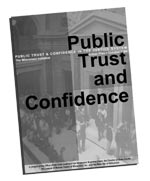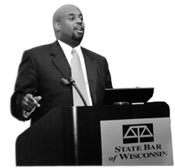| |
 |
|
|
Vol. 74, No. 8, August 2001
|
 Page
1: 2001 Annual Report Page
1: 2001 Annual Report
Research
Research on the legal profession took many shapes at the Bar during FY01,
including querying members about the image of the profession, conducting
public focus groups about trust and confidence in the justice system,
and surveying members about the economics of practicing law. In addition,
the Bar conducts an ongoing assessment of its products and services, including
conducting a member needs assessment every three years, mailing 60-second
surveys and holding focus groups to generate input on specific CLE seminars
and books, and mailing product/order feedback cards with each product
shipment.
Public Image of the Profession. In surveys, focus groups, and
roundtable discussions, members have asked the State Bar to "do more"
to enhance the image of the profession. As a result, in FY01 the State
Bar embarked on a long-range image campaign that involves developing positive
public messages about the legal profession. The State Bar reviewed national
research, conducted statewide public phone surveys, and organized focus
groups with members in Madison, Milwaukee, and La Crosse to collect substantial
data on the image of the profession. In FY02, the State Bar will work
with a member oversight committee to formulate positive messages about
the profession to enhance our existing public relations efforts. The campaign
- an ongoing initiative dedicated to enhancing the image of lawyers by
increasing the public's understanding of the profession - will help focus
all of our external communications around a central theme.
 Public
Trust and Confidence. The Public Trust & Confidence Committee - a
partnership of the State Bar, the Office of the Chief Justice, the Director
of State Courts, and the Wisconsin League of Women Voters - issued an
action plan in FY01 outlining strategies to improve the justice system
and promote public trust. The action plan shapes existing efforts of the
State Bar, the courts, law enforcement agencies, and community groups.
The committee recommended five actions: provide equal treatment in the
justice system; encourage judicial/attorney involvement in the community;
enhance satisfaction with the juvenile justice system; increase empathy
in the justice system; and improve the selection and treatment of jurors. Public
Trust and Confidence. The Public Trust & Confidence Committee - a
partnership of the State Bar, the Office of the Chief Justice, the Director
of State Courts, and the Wisconsin League of Women Voters - issued an
action plan in FY01 outlining strategies to improve the justice system
and promote public trust. The action plan shapes existing efforts of the
State Bar, the courts, law enforcement agencies, and community groups.
The committee recommended five actions: provide equal treatment in the
justice system; encourage judicial/attorney involvement in the community;
enhance satisfaction with the juvenile justice system; increase empathy
in the justice system; and improve the selection and treatment of jurors.
This committee reviewed the wealth of national and local research concerning
issues of public trust and confidence. Using this research and the committee
members' personal experience with Wisconsin's justice system, the committee
developed a list of issues that create barriers to public trust and confidence.
In addition, the committee hosted five statewide focus groups, soliciting
input from three groups of individuals who had recent encounters with
the system (former offenders and their families, civil litigants, and
jurors) and two groups comprised of randomly selected people.
The State Bar supports bringing together leaders of the judiciary, the
legal profession, law enforcement, local government, and community groups
to discuss the plan's implementation. Planning will get underway in fall
2001.
Economics of Practice Survey. At the end of FY01, the State Bar
developed its third Economics of Law Practice Survey, a direct result
of the hundreds of inquiries received annually from members for up-to-date
information on law firm economics. The survey results, available this
fall, assist lawyers in measuring their ability to provide cost-effective
legal services and gathering information to react to the public's perception
about attorney income and overhead. The survey covers law firm economic
issues such as: billing practices, time spent on billable and nonbillable
activities, attorney hourly rates, overhead expenses, and salary information
for associates, legal assistants, and legal secretaries.
Knowledge Exchange
The State Bar, as directed by the Wisconsin Supreme Court, provides a
forum for exchanging information about the legal profession. The State
Bar accomplishes this by hosting hundreds of seminars and meetings annually,
organizing an annual gathering of the members, creating committees to
address contemporary issues such as enhancing diversity, and producing
a host of legal publications, including a monthly magazine that features
cutting-edge legal issues and trends. The State Bar also uses its Internet
site, WisBar, in a variety of ways to facilitate communication between
members. Thousands of members participate in electronic mailing lists
on topics specific to their interests.
Convention. More than 700 members attended the CLE programs and
social functions at the 2001 State Bar Annual Convention in Lake Geneva
in May, where Madison attorney Gerry Mowris was sworn in as the 46th State
Bar president.
"Lawyers don't have a great public image," said Mowris. "We need to
get back the public trust and confidence so we can effectively do the
job of the third branch of government. I am committed to working with
the courts and the public toward improving that trust and confidence.
We need to educate the public about what we do." Mowris also vowed to
support efforts begun by Gary Bakke and the Executive Committee under
the Seize the Future initiative. A highlight of the convention was the
presidential showcase program on DNA evidence and the broader issue of
problems in our justice system, sponsored by the Individual Rights & Responsibilities
and Criminal Law sections. Nationally acclaimed DNA evidence expert Peter
Neufeld, coauthor of Actual Innocence, led a panel discussion on the growing
recognition that persons charged with crimes, whether pretrial or post-conviction,
should have access to available scientific and forensic tools to determine
innocence.
Committees, Sections, Divisions. Members exchange information
to improve the practice of law and their personal lives through the work
of 25 sections, three divisions, and 36 committees. As only one example
of the diversity of the work these groups undertake, the Professionalism
Committee took on the task of identifying the profession's core values,
which will be used as a basis for future discussions on multidisciplinary
practice, multijurisdictional practice, and other future of the profession
topics. The committee identified three core values unique to the legal
profession: respect for the rule of law, maintenance and advancement of
the integrity of the legal system, and ethical representation of and service
to clients.
 |
Assistant District
Attorney Derek Mosley acted out a sentencing hearing based on an actual
case involving homicide by intoxicated use of a motor vehicle as part
of the third annual Courts and the Media seminar in Milwaukee. |
Courts and the Media. Bringing together various players in the
justice system to better understand each other's roles, more than 75 circuit
court judges, justices, and journalists participated in a lively debate
about the justice system at the third annual Courts and the Media seminar,
presented by the State Bar's Media-Law Relations Committee and the Wisconsin
Supreme Court.
Reporters sentenced a defendant based solely upon a news story about
an actual case involving homicide by a motor vehicle while intoxicated.
Then a group of judges and attorneys acted out a sentencing hearing based
upon the information presented in the presentence report and the actual
hearing. Reporters' sentences were far more lenient after knowing all
the facts. Media representatives shared their sentences with the judges,
who suggested headlines based on the sentences.
Diversity Initiatives. One of the great outcomes of members volunteering
time and sharing expertise is the development of successful programs aimed
at diversifying the profession to better reflect society. One of the most
successful of these efforts is the summer minority clerkship program.
In FY01, 21 first-year law students from Marquette University Law School
and the U.W. Law School were placed in law firms, corporate legal departments,
and government agencies for 10 to 12 weeks. The program offers a rare
opportunity to develop real-world legal experience after only one year
of law school course work.
Now in its eighth year, the Committee to Encourage the Placement of
Minority Lawyers, which coordinates the clerkship program, has given more
than 100 students practical exposure to legal environments, while enabling
participating employers to promote diversity in their organizations.
Electronic Communication. In response to the growing use of technology
to disseminate information and facilitate communication, the State Bar
manages nearly 60 electronic mailing lists to support the work of various
entities and encourage lawyer-to-lawyer dialog. Email list subscribers
send or receive information or advice on matters of common interest. More
than 3,300 members subscribe to CaseLaw Express, a popular free service
that emails weekly Wisconsin Supreme Court and Court of Appeals decisions.
Other special interest groups, like the Solo and Small Firm Committee
and the Family Law Section, sponsor lists for attorneys working in smaller
firms or environments, or practicing family law. Questions unique to these
groups are quickly answered.
Wisconsin Supreme Court. The State Bar plays an important role
in advising the courts on issues affecting the practice of law, from changes
to the lawyer regulation system to initiatives for improving the delivery
of services to the public. As one example, the State Bar testified at
a public hearing on a petition to create a mandatory fee arbitration system
for lawyer-client fee disputes, which was opposed by the Board of Governors.
The court called for a study on the need for mandatory fee arbitration
in Wisconsin.
Page
3: Advocacy 
|
